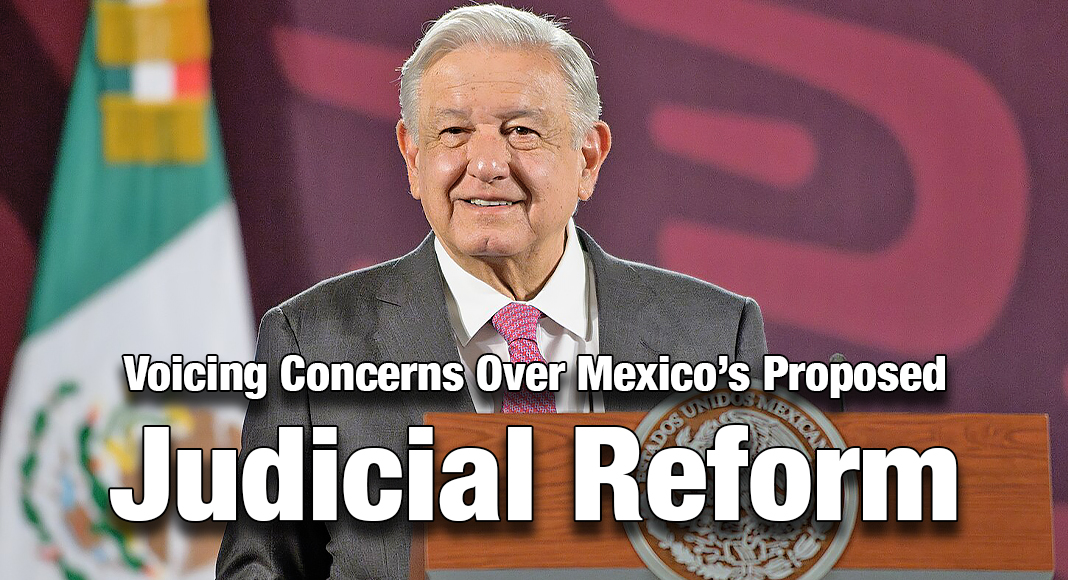
Texas Border Business
Texas Border Business
For over a century, the American Chamber of Commerce of Mexico (AmCham), a vital institution in Mexico’s economic and social landscape, has expressed significant concerns about President López Obrador’s proposed judicial reform. In a recent statement, AmCham warned that the reforms could harm Mexico’s judicial system and economic stability.
Concerns Over Judicial Independence and Economic Impact
“The American Chamber of Commerce of Mexico believes that legal transparency and judicial independence are crucial for economic prosperity,” stated AmCham in its recent release. The organization stressed that the proposed judicial reforms threaten these principles, potentially undermining the judicial system’s integrity and Mexico’s overall investment climate.
AmCham’s Role in Mexico’s Development
Since its establishment in 1917, AmCham has been a key advocate for Mexico’s socio-economic growth, participating in employment support, disaster recovery, and public health initiatives. “Our commitment to Mexico’s future is unwavering,” emphasized AmCham. The Chamber highlighted American companies’ significant role in the Mexican economy, pointing out that they accounted for over 44% of foreign direct investment (FDI) in the first quarter of 2024 and supported more than 10 million formal jobs across the country.
Key Concerns About the Judicial Reform
AmCham’s statement outlined several critical issues regarding the proposed judicial reform:
- Threats to Judicial Independence: “We are deeply concerned that the proposed reforms could jeopardize the independence of the judiciary,” AmCham stated. “A compromised judiciary could lead to biased rulings, eroding public trust in the legal system and undermining the rule of law.”
- Impact on Judicial Professionalism and Efficiency: The Chamber noted that the reforms might delay the professionalization of specialized justice, increase costs, and reduce the efficiency of the judicial system. “Such changes could create uncertainty for investors and complicate the resolution of legal disputes, ultimately increasing the cost of doing business in Mexico,” warned AmCham.
- Economic and Investment Implications: According to AmCham, “uncertainty in the judicial system could deter future investments and disrupt business operations, negatively impacting Mexico’s economic growth.” The Chamber stressed that legal instability could lead to decreased investor confidence, reducing the inflow of foreign capital vital for economic development.
- Potential Violation of USMCA Commitments: AmCham also raised concerns about potential violations of Mexico’s commitments under the United States-Mexico-Canada Agreement (USMCA). “Maintaining independent labor courts and promoting alternative dispute resolution mechanisms are essential commitments under the USMCA,” the statement highlighted. “Any deviation from these commitments could strain trade relations with the United States and Canada, possibly leading to disputes or sanctions.”
AmCham’s Call for Action
In response to these concerns, AmCham called for a series of measures to ensure any judicial reform is carefully considered and implemented:
- Continued Dialogue and Collaboration: “We urge ongoing dialogue among the Mexican government, private sector, and international stakeholders to fully assess the implications of the proposed judicial reform,” AmCham advised. This approach aims to foster a collaborative environment where potential risks can be mitigated and common ground can be found to support judicial improvement and economic stability.
- Strengthening Judicial Independence and Professionalization: The Chamber emphasized the need to bolster, not weaken, judicial independence and professionalism. “Efforts should focus on enhancing the judiciary’s ability to uphold the rule of law through additional training, resources, and supportive policies,” AmCham recommended.
- Reaffirmation of International Commitments: “It is crucial for Mexico to reaffirm its commitments under the USMCA,” AmCham insisted. By doing so, Mexico can reassure international investors and trading partners of its commitment to upholding legal standards and trade agreements.
- Transparent Evaluation of Reform Impacts: AmCham called for “a thorough and transparent evaluation of the proposed judicial reform’s potential impacts on Mexico’s legal and economic environments.” The Chamber suggested involving a wide range of perspectives, including those from the private sector, legal experts, and civil society, to ensure a comprehensive understanding of the reform’s potential consequences.
While acknowledging the need for judicial reform in any democracy, AmCham cautioned that such reforms must be approached with careful consideration of their broader impacts. “The path forward should be marked by cautious deliberation, inclusive dialogue, and a steadfast commitment to justice and economic prosperity,” concluded AmCham.













